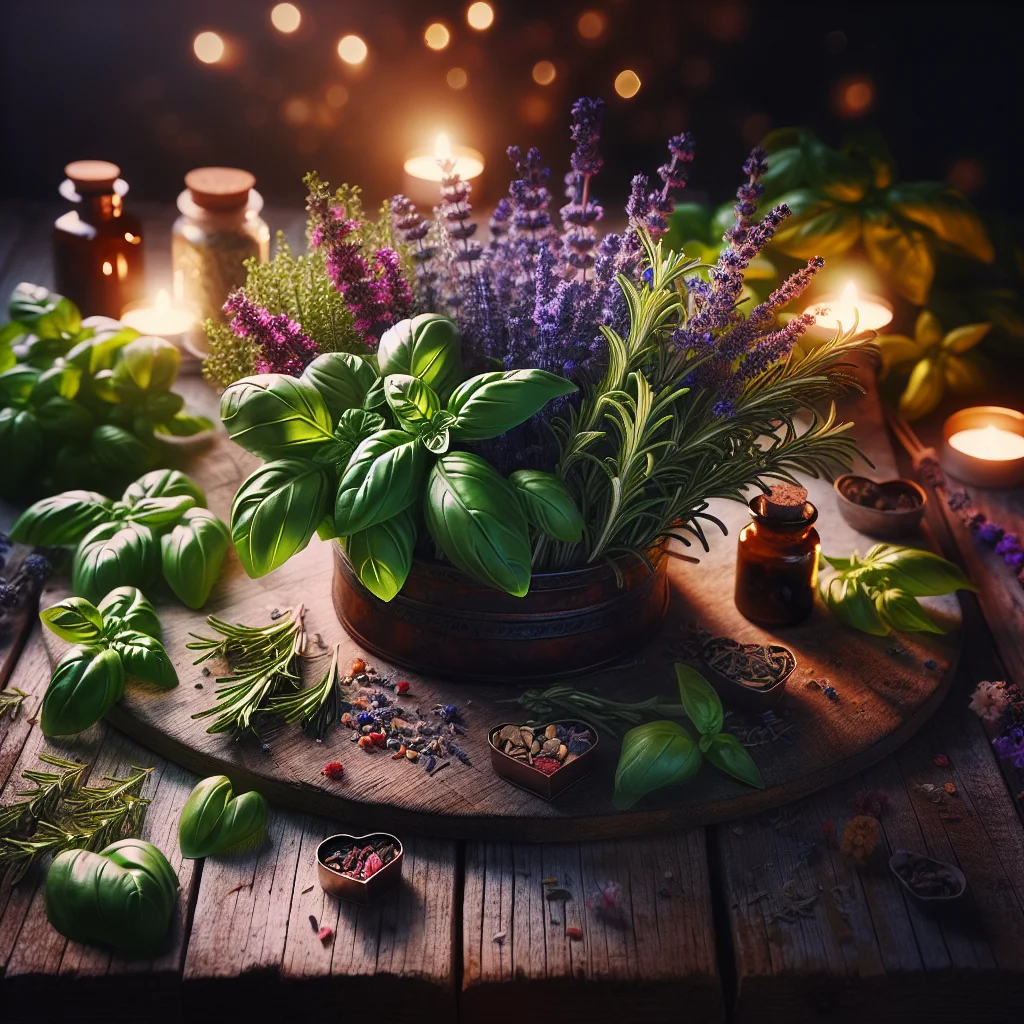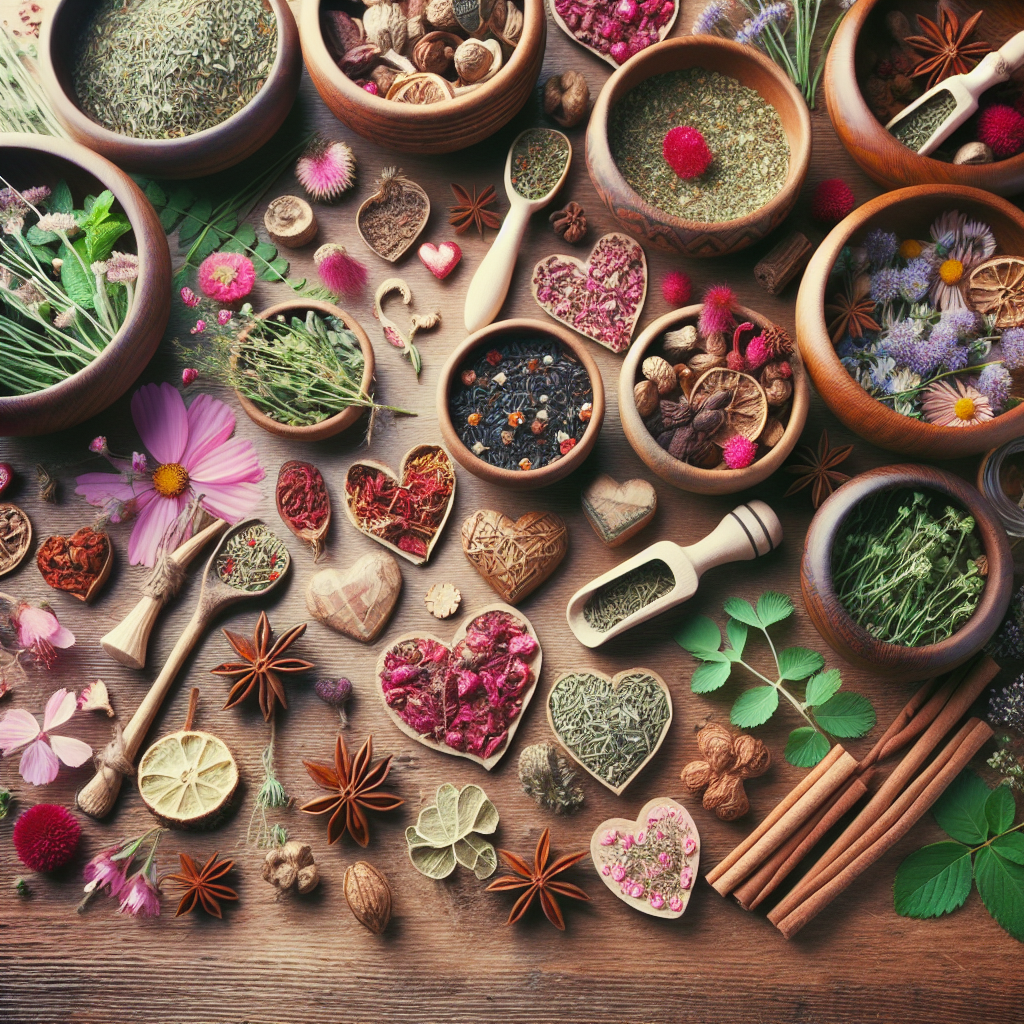As an Amazon Associate I earn from qualifying purchases.
For centuries, various cultures have believed that certain herbs possess the power to attract love or strengthen romantic feelings. In ancient times, people often carried love-inducing herbs or included them in rituals and potions with the hope of kindling romance or ensuring the fidelity of their partners. These practices were deeply entwined with the local folklore and traditions, highlighting the human desire to influence matters of the heart through natural means.
The tradition of using herbs for love has a rich and varied history, branching across civilizations. In Ancient Greece, for instance, Aphrodite, the goddess of love, was often associated with plants such as roses and myrtle, which were common in love spells and adornments. In the Middle Ages, European folk practices included the use of herbs like lavender and sage in love sachets to attract suitors, while in some Asian cultures, herbs like ginseng were believed to have aphrodisiac properties.
In modern times, the interest in herbal remedies and holistic approaches to well-being has revived the exploration of herbs for emotional and romantic enhancement. It is estimated that the global herbal supplement market was valued at over $5 billion in recent years, illustrating the ongoing fascination with natural wellness solutions, including those for love and relationships.
One engaging aspect of herbs used for love is their versatility. Take, for instance, rose petals, which can be used to make tea believed to stir the heart’s emotions, or basil, which in some folk traditions is thought to generate feelings of affection when added to food. Then there’s the legendary Damiana, an herb native to Central and South America, long cherished for its supposed ability to increase sexual desire.
While the scientific community often debates the efficacy of herbs for emotional states, many individuals continue to incorporate these plants into their life as part of their personal wellness routines. Whether for their purported mystical properties or simply for the pleasure of their aromas and flavors, herbs for love remain a beloved aspect of cultural practices around the world.
“`html
What Are the Most Potent Herbs for Attracting Love and Enhancing Romance?
“`
Throughout history, various cultures have touted the mystical properties of certain herbs in attracting love and bolstering romantic relationships. This intriguing concept stems from herbalism, where plants are believed to possess energies that can influence human emotion and interaction. Some popular herbs reputed for their love-enhancing qualities include roses for their association with passion, lavender for promoting a calming and loving atmosphere, and basil thought to foster deep connection. Each herb is believed to have unique properties that can be woven into rituals or used in personal care items to invite love into one’s life. Below, we delve deeper into the fascinating world of love herbs, exploring how they’ve been utilized in traditional practices, modern-day interpretations, and how you can incorporate these botanical treasures into your own quests for love and romance.
Herbs for love have been used throughout history as natural remedies or magical ingredients that are said to evoke affection, enhance romantic feelings, and foster deeper connections between people. The belief in the power of these botanicals extends across diverse cultures and traditions and continues to capture the human imagination today.
**Rose Petals**: Perhaps the most iconic of all love-related herbs, roses have symbolized love for centuries. The scent and the essence of rose petals are used in love spells, teas, and sachets to attract love and enhance sexual intimacy. Their association with the heart chakra in various spiritual traditions underscores their significance in matters of love.
**Lavender**: Known for its calming scent, lavender is often used to soothe tension and anxiety, which can be beneficial in maintaining harmonious relationships. Its use in love spells is also prevalent; it’s believed to encourage peace, happiness, and a spiritual connection between partners.
**Basil**: In Italian folklore, basil is considered to be a symbol of love, and serving it to a potential suitor is said to secure their affection. Its aromatic leaves are used in various cuisines to spice up a romantic dinner. Moreover, basil is thought to foster fidelity and open communication in a relationship.
**Damiana**: This small shrub is native to Mexico and has been used traditionally to relieve anxiety, nervousness, and mild depression—conditions that can affect romantic relationships. Damiana is often consumed as a tea or included in love potions due to its reputation as an aphrodisiac.
**Ginseng**: Widely regarded for its strengthening and revitalizing properties, ginseng is often revered as a tonic for love. It is believed to increase libido and enhance physical endurance, thereby invigorating a couple’s love life.
**Jasmine**: With its alluring fragrance, jasmine is often included in love sachets and oils. It’s used to attract spiritual love and to enhance the sensuality between partners. The soothing properties of jasmine also promote relaxation and help to boost confidence during romantic encounters.
**Yarrow**: Yarrow is an herb linked to love and attraction, traditionally used in wedding decorations and love spells. It’s believed that yarrow can foster courage and clear communication pathways, which are crucial in forging a loving connection.
**Vanilla**: The sweet, warming scent of vanilla makes it a popular ingredient in both perfumes and desserts. It’s commonly thought to induce feelings of love and affection and is included in many love rituals to enhance sensuality and comfort.
**Cinnamon**: This well-loved spice is often associated with passion and is frequently used in love spells to “heat up” a romance. In addition to its culinary uses, cinnamon is believed to bring energy and vitality to love relationships.
While herbs can certainly play a symbolic role in the pursuit of love, it’s essential to approach their use with respect and an understanding of their effects. Modern research continues to explore the potential health benefits of many herbs that have historically been linked to love and attraction.
In recent studies, certain herbs have been found to possess properties that can impact hormonal balance and mood regulation—factors that can indirectly influence romantic feelings and sexual desire. For instance, according to a survey published in “Evidence-Based Complementary and Alternative Medicine,” nearly 80% of participants reported that natural botanicals, including herbs, were perceived to have positive effects on their personal relationships and general well-being. This statistic underscores the lasting interest in and relevance of using herbs for love in contemporary practices.
“`html
Q1: What are some common herbs used for promoting love?
A: Common herbs that are associated with love include rose petals, jasmine, lavender, basil, cinnamon, honey, and vanilla. These herbs are often used to create a romantic ambiance or included in love rituals.
Q2: How do I use herbs to spice up my relationship?
A: You can use herbs by adding them to a relaxing bath, making a tea to share with your partner, using them in cooking a romantic meal, or creating a sensual massage oil with herb-infused essential oils.
Q3: Are there any herbs believed to help with fertility?
A: Yes, some herbs traditionally believed to aid fertility include red clover, raspberry leaf, chaste berry, and maca. Always consult with a healthcare practitioner before using herbs for fertility.
Q4: Can herbs really affect my love life?
A: Many individuals believe in the emotional and spiritual influence of herbs and use them as part of their love rituals. While scientific evidence on the efficacy of herbs affecting one’s love life is limited, they can set a mood or provide symbolic meaning for couples.
Q5: Are there any risks in using herbs for love?
A: As with any herbal remedy, there may be risks especially if you have allergies, are pregnant, breastfeeding, or have a medical condition. Always do a patch test for topical applications and consult with a healthcare provider before consuming any herbs.
Q6: What is a simple love spell with herbs that I can try?
A: A simple love spell involves writing down your intentions for love on a piece of paper, placing it beneath a candle, and surrounding the candle with love-associated herbs like rose petals while focusing on your intentions. However, remember that consent and respect in relationships are paramount and cannot be influenced by spells.
Q7: How can I incorporate herbs into a Valentine’s Day gift?
A: You can create a handmade herbal gift such as a sachet filled with aromatic herbs, a personalized blend of herbal tea, or a bottle of essential oil infused with love-related herbs.
Q8: Can herbs be used to mend a broken relationship?
A: While herbs can be used symbolically to set intentions for healing, open communication and professional counseling are essential in addressing issues in a relationship. Herbs alone cannot mend a broken relationship but may contribute to a supportive and caring environment.
Q9: What are the best ways to store herbs for maintaining their potency?
A: Herbs should be stored in a cool, dry place away from direct sunlight. Use airtight containers to keep them fresher for longer and consider labeling the containers with the date of purchase or harvesting to keep track of their freshness.
Q10: Where can I source high-quality herbs?
A: High-quality herbs can be sourced from reputable health food stores, local farmers’ markets, or specialized herb shops. Always ensure the source is reliable, and the herbs have not been treated with pesticides or other harmful chemicals.
“`

Conclusion
Throughout history, herbs have been intertwined with the concept of love, serving as symbols, remedies, and enhancers of romantic feelings. Key points discussed in the article highlight the use of herbs such as rosemary for remembrance in love rituals, lavender for fostering tranquility and deeper connections, and damiana for its aphrodisiac properties. We also touched upon basil, which is celebrated for attracting love, and the enchanting allure of roses, which have represented love across various cultures and eras. Insight into the preparation and application of these herbs was provided, illustrating their integration into teas, baths, and even culinary recipes to ignite or reinforce romantic bonds. It’s important to acknowledge the blend of cultural beliefs and anecdotal evidence that often accompanies the use of herbs in matters of the heart.
From a modern perspective, the psychological impact of these herbs cannot be underestimated. Whether it’s through aroma, taste, or visual appeal, herbs have the potential to trigger emotional responses and create an atmosphere conducive to love. Engaging with herbs for love is as much about fostering a mindset as it is about the herbs’ inherent qualities. Scientific inquiry into their properties has offered some support to age-old practices, revealing that certain herbs contain compounds that can influence mood and well-being. As we continue to blend tradition with contemporary understanding, the role of herbs in nurturing love remains a testament to the enduring search for connection and intimacy in human relationships.
Amazon and the Amazon logo are trademarks of Amazon.com, Inc, or its affiliates.


